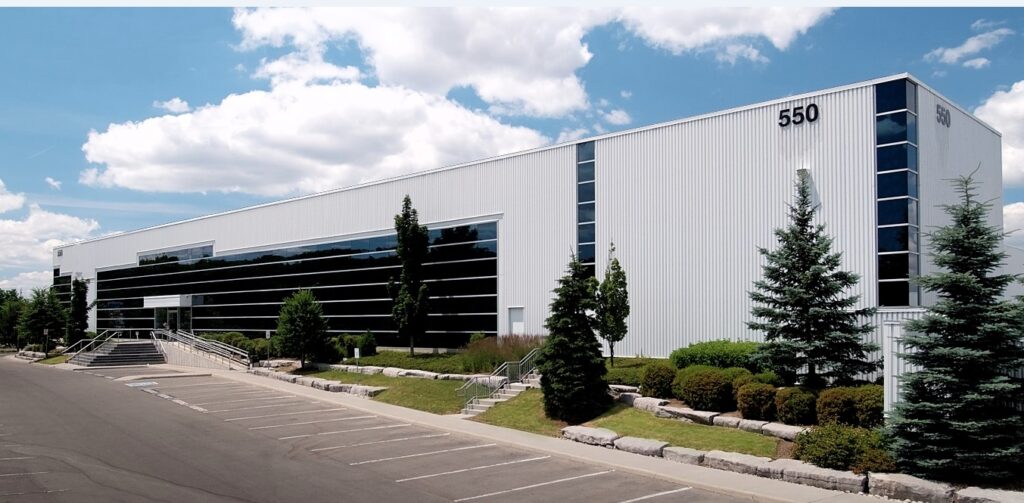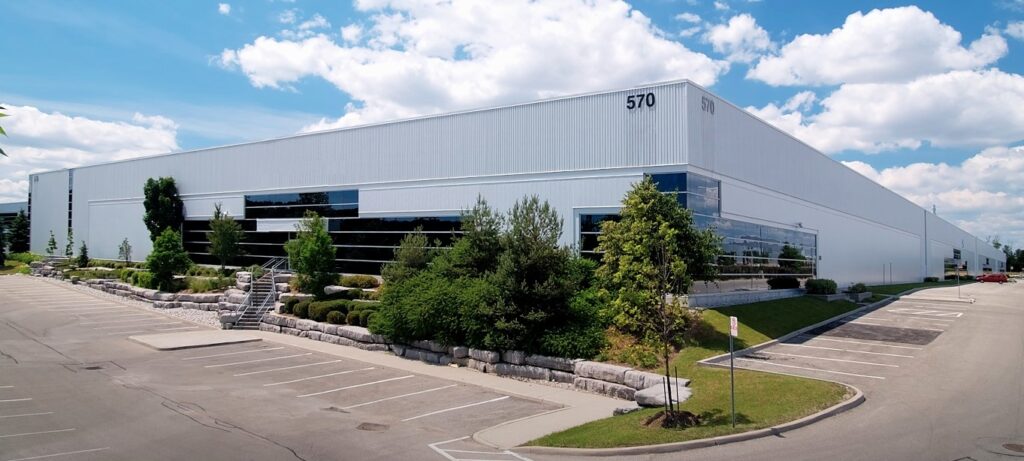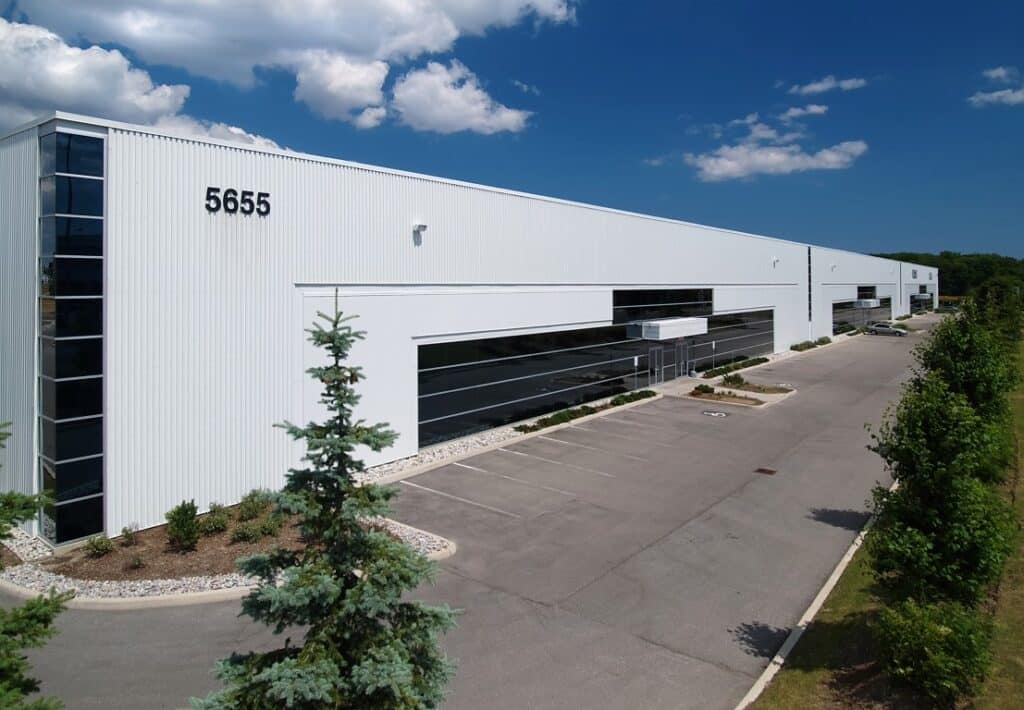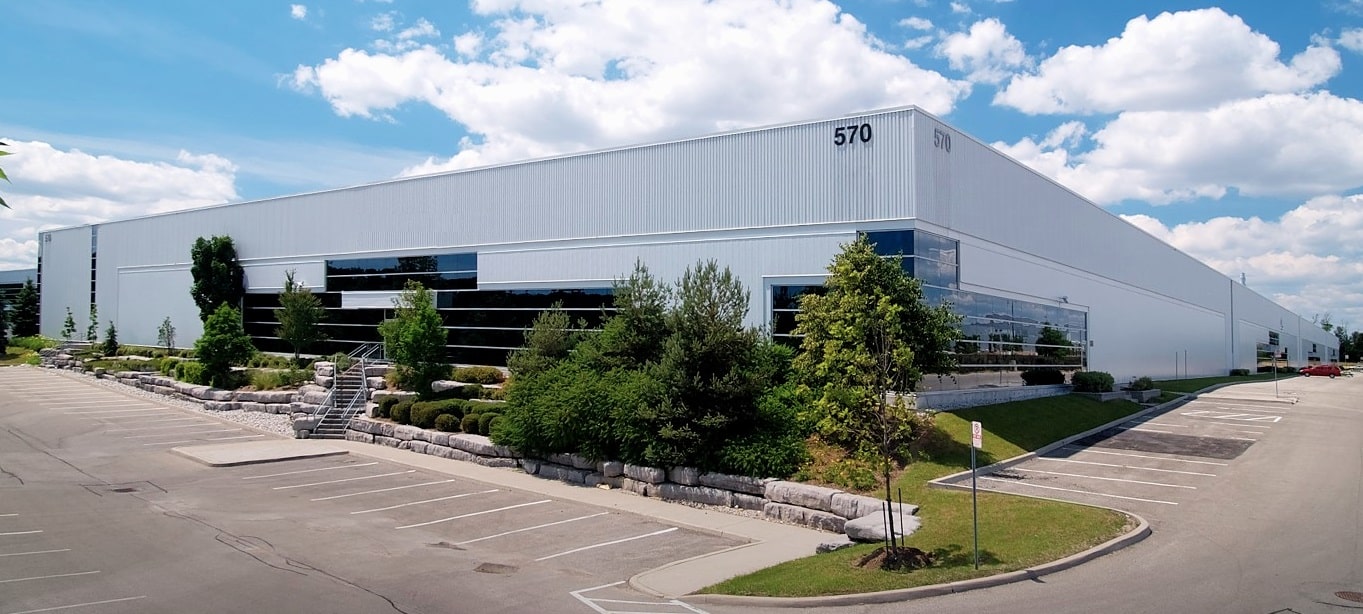Matheson Kennedy Complex
Mississauga, Ontario
October 17, 2025
- Rating System/Standard
- LEED v4.1
- Certification Level
- Gold
- Building Type
- Industrial
| Buildings | Certification Year | Rating System | Version | Level |
|---|---|---|---|---|
| 550 & 570 Matheson Boulevard East, and 5655 Kennedy Road | 2025 | LEED O+M: Existing Buildings | v4.1 | Gold |
A modern industrial complex with a green mission
Situated on 28.5 acres in Mississauga, Ontario, the Matheson Kennedy Complex (MKC) is a premier light industrial development comprising three single-story buildings: 550 & 570 Matheson Blvd East and 5655 Kennedy Road. Designed to accommodate both office and warehouse tenants, MKC integrates functionality with sustainability. Notable features include a designated parking lot with five electric vehicle charging stations and 18 carpool spaces, reinforcing its commitment to low-carbon transportation.
In 2021, MKC earned BOMA BEST Platinum—setting the stage for its subsequent LEED journey and ongoing performance improvements. From indoor air-quality testing and energy audits to tenant health and safety training and appreciation events, the complex continues to foster a culture of environmental stewardship and tenant engagement.
Case Study Team
- Energy and Sustainability Consultant
- Ecovert
Leveraging certification to build long-term market resilience
The property owner and manager pursued Leadership in Energy and Environmental Design® (LEED) certification to reinforce its Environmental, Social, and Governance (ESG) commitments and showcase leadership in the evolving light industrial sector. Specifically, the project targeted LEED v4.1 Operations and Maintenance (O+M) — a performance-based certification available to buildings that have been operational for at least one year, with scoring based on verified data across energy, water, waste, transportation, and indoor environmental quality. Certification is valid for three years and must be renewed to maintain active status.

LEED provided a rigorous, performance-based framework to validate recent upgrades and retrofits across the complex, including LED lighting, HVAC improvements and building envelope enhancements.
Pursuing certification under the LEED (O+M) rating system was a strategic move to strengthen the asset’s market position and long-term value. The process provided a framework to validate operational performance, identify cost-saving opportunities, and align with investor expectations around ESG. It also supported Menkes’ broader approach to future-proofing its portfolio in a rapidly shifting regulatory and economic landscape.
With the support of the building owner, Menkes chose to pursue a LEED certification for the Matheson Kennedy Complex to demonstrate our commitment to the highest standards of environmental sustainability. As an established innovator, we aimed to solidify the complex’s position as a leader within the industry of light industrial buildings, while gaining a competitive edge.
Elena Muto, General Manager, Menkes Property Management Services Ltd.
A data-driven, future-focused approach
Menkes approached LEED v4.1 certification with a long-term, performance-driven strategy. Planning began two years in advance, allowing the team to align all stakeholders, coordinate with LEED consultants from Ecovert, and ensure that assessments and surveys would fall within the appropriate reporting periods.
The certification process centered on tracking actual building performance using the Arc platform, supported by detailed utility data collection and targeted efficiency upgrades. Key initiatives included:
- Installation and balancing of belt drive exhaust fans and gravity intake fans
- Deployment of efficient irrigation systems
- Regular indoor air quality testing and annual occupant satisfaction surveys
This data-driven approach not only validated the effectiveness of recent retrofits—such as equipment upgrades, envelope improvements, and LED lighting, but also uncovered opportunities for operational optimization. In parallel, Menkes completed a decarbonization study across the complex, identifying future retrofit pathways aligned with Canada’s net-zero building targets and reinforcing the long-term value of the asset.
Navigating complexity through collaboration
While early planning laid a strong foundation, executing a performance-based certification across a multi-tenant industrial complex presented real-world challenges. Chief among them was securing complete and accurate utility data from tenants—an essential requirement for LEED scoring via the Arc platform.
To address this, the property management team led a coordinated outreach effort, working closely with tenants to collect missing invoices and ensure all consumption data was properly uploaded. Their cooperation proved critical, enabling each building to meet the data requirements and achieve high performance scores.

Tenant engagement proved to be a defining success of the project. In addition to providing utility data, tenants actively participated in occupant satisfaction and transportation surveys, directly contributing to strong Indoor Environmental Quality scores. This collaboration also strengthened relationships between tenants and management, creating a more connected community within the complex.
Ultimately, the combination of early planning and sustained engagement helped all three buildings achieve LEED Gold certification.
Operational efficiencies, cost savings, and future readiness
The LEED Gold certification process delivered tangible operational and environmental benefits for the complex. Through rigorous third-party evaluation and tenant engagement, Menkes gained a comprehensive understanding of building performance and occupant satisfaction.
Pursuing LEED Gold certification required more than just implementing efficient building systems — it demanded measurable performance demonstrated through comprehensive audits and assessments. These evaluations offered critical insights into how the buildings were operating in practice, validating their high standards while also identifying areas for continued improvement.
Elena Muto, General Manager, Menkes Property Management Services Ltd.
These savings reflect the effectiveness of systems upgrades and underscore the financial and environmental value of performance-based certification. Additionally, the experience has informed Menkes’ approach to future projects, embedding sustainability metrics into the fabric of operational planning, design, and tenant experience.
Plan, engage, and monitor
Menkes offers the following guidance to peers considering LEED certification:
Start early: Begin planning well in advance to allow for data collection, upgrades, and stakeholder coordination.
Engage stakeholders: Keep tenants, contractors, consultants, and internal teams aligned throughout the process.
Hire experienced consultants: LEED experts help streamline the journey and unlock cost-effective solutions.
Monitor performance continuously: Certification is not just about efficient systems—it’s about proving performance through ongoing tracking of energy, water, waste, air quality, and occupant satisfaction.
Think long term: LEED is a commitment to continuous improvement, not a one-time achievement.


